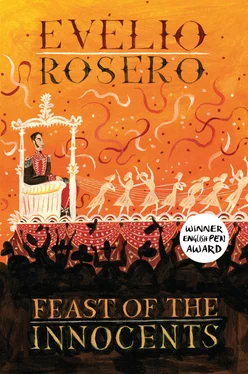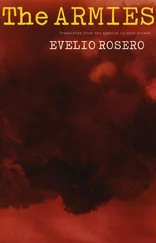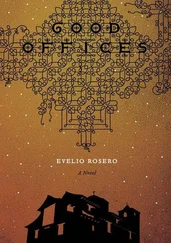The secret poet Rodolfo Puelles had returned to Pasto after that whole venture in a state of shock, his life for ever divided into a “Before” and “After.”
As a “trial by fire,” the members of the group (without anyone knowing who came up with the idea, nor how or when) had decided to “eliminate an enemy”: kill a policeman, the secret poet repeated to himself, still incredulous; a policeman they had already had under surveillance and who did nothing but earn his wages chasing pickpockets in Bogotá; a policeman, what’s more, who was in civilian clothing at the moment of his “execution”; they killed him when he went to buy milk at a shop, one block from his house, in a working-class neighbourhood. He was the enemy. The enemy, the secret poet thought, what enemy? He was not in the least convinced.
Although the revolution should give no respite, a trial like that never seemed necessary to him, and he had not managed to get a decent night’s sleep since, but the reason he could not sleep in peace — over and above everything else in the world — was because it was him, in short, Rodolfo Puelles, secret poet, who had shot the policeman, an “indigenous-looking man in a poncho who turned out to be a police officer”—as reporters for the gutter press would later describe him—“He went out to buy milk, and never came home,” “Killed for a bottle of milk,” “Policeman, out of uniform, was buying milk,” “Thieves unaware he was carrying service revolver.”
It happened at seven o’clock at night.
Enrique Quiroz was in charge of the strike: when the big moment arrived, he froze. The other Quiroz got drunk the night before, and had stayed that way. There were three more from the Pasto front with Puelles and Quiroz—“Ilyich” from Cali, “Catiri” from the plains, and “Ulyanov” from Chocó—and four from Bogotá, scattered at strategic points around the objective: all frozen. Only the secret poet fired once, at the head. Yet he was the most frightened and the one who least supported the action. He fired out of pure, physical fright, he thought; he remembered he’d wet himself as he did it. The policeman crumpled instantly and they all fled, every man for himself; they did not seize the police weapon. Did anyone take the bottle of milk? No, that was an invention of the bourgeois press, they said, it must have been filched by the homeless guy who was looking on.
They returned to Pasto by separate routes, and only met up again after several nightmarish days.
Enrique Quiroz could not forgive the fact that no-one had taken the victim’s gun, that no-one retrieved it as a trophy, that they did not leave a written note, that they did not shout a defiant warning, a challenge, advance notice of the new revolutionary force. “What utter retards,” he bawled, “and we haven’t even got a name.”
Quiroz, better than anyone, understood the radicalism of guerrilla war, and applauded it. The year before, a commander in the People’s Army had executed a deserter. That was something else, he thought, that was betrayal, and fully deserved execution. The death of the policeman was a mistake that Enrique Quiroz, the real originator of the idea, did not want to, nor could ever, admit to in front of his men—“Bolívar made big mistakes,” he said to himself, “the mistakes of a great man: necessary errors, but he didn’t go around confessing them”—and when the group was back together again, in the safety of the parish church of Nuestro Señor de los Despojos, he told them the elimination of anyone in uniform was one more victory for the revolution, and that the death of a policeman must not be “sentimentalized,” because even if he was a plain and simple officer, he was someone who, although an authentic son of the people, was still in the service of imperialism, the master’s dog, the guardian of the oppressor, dammit, this is a war to the death, like the one Bolívar waged against the Spaniards. And he banged his fist on the table:
“Don’t mention the matter again, you bastards, nobody cry over it.”
Several of Enrique Quiroz’s acquaintances, active supporters of the revolution, had already gone into the mountains of Colombia to support the insurgents and follow in the footsteps of Che and Fidel, fine examples of manhood, Quiroz said to the group.
Rodolfo Puelles disagreed. In Bogotá, in the cafeteria at the National University, he had heard about another “execution” in the mountains, of two young members of the guerrilla forces: driven by hunger, they stole a block of cane sugar from the command stores. They were killed. The deaths of these hungry young men — were they an invention by the enemy oligarchy to discredit the insurgence, or was it all true? And he had heard, without being able to verify it, about the mistreatment of recently recruited university students, about the contempt they were treated with if they were seen reading, writing or — worse still — if they expressed their desire to educate the campesinos , or stumbled in training exercises, or tired during the terrible forced marches and collapsed. Revolutionary enthusiasm was a powerful force, the elation was immense, but the muffled messages issuing from the mountains gave rise to doubt: something bad could be going on, Puelles thought, something harmful about the way things were advancing, in how devotion and effort were being used or abused.
Puelles, who stayed with his uncle — a taxi driver by profession — when he went to Bogotá, had disappointing experiences. One of his earliest contributions to the cause was handing over the keys for his uncle’s taxi to three comrades who would carry out an “act of expropriation” on a small neighbourhood fruit and vegetable market. The night the keys were handed over, when the three revolutionaries (Ilyich from Cali among them) went off in his uncle’s taxi, they crashed straight into the lamp post on the corner. None of them knew how to drive: were they really intending to carry out a revolutionary act, or were they just planning to go out on the town? One Saturday at “rehearsal” in the church, Puelles ironically brought up that particular failure, the lack of preparation. Ilyich from Cali stood up for himself at the top of his voice, like he was barking. He had an extraordinary face: one eye blue, the other black. Sallow and skinny, it was Toña Noria who had given him a nickname that stuck: she said he was thin as a plate and from then on they called him “Platter,” although alongside his nom de guerre , Ilyich, of which he was so proud. He launched himself at Puelles to shut him up. Enrique Quiroz and the comrade from the plains pulled them apart. “That’s just what imperialism wants,” Quiroz said, “for us to kill each other. Are we going to oblige them?”
A meek silence followed his words.
Enrique Quiroz was not just the leader of the group, he was also the oldest: twenty-seven. And he saw, or felt as though he saw, the people surrounding him for the first time: they were very young, he thought, maybe too young, and he concluded that so much youth is a double-edged sword.
They studied Lenin, Engels and Mao together, carrying What is to be Done?, The Part Played by Labour in the Transition from Ape to Man and Five Essays on Philosophy in their pockets as standard issue, prepared to “triumph or die”—as they used to chant in emphatic voices at the beginning of each rehearsal. “Actually, to triumph,” Quiroz told them, “the ‘transformation’ is a matter of months away — two years, at most.” That is what he told them the morning of Saturday, December 31, because he was utterly convinced not only that they would still be young men when the revolution triumphed, but that they themselves would make it happen.
Nineteen sixty-six was over.
Читать дальше












